- Home
- Quizzes
- My Quiz Activity
- Newsletters
- Sports Betting
- MY FAVORITES
- Add Sports/Teams
- SPORTS
-
NFL
- NFL Home
- Arizona Cardinals
- Atlanta Falcons
- Baltimore Ravens
- Buffalo Bills
- Carolina Panthers
- Chicago Bears
- Cincinnati Bengals
- Cleveland Browns
- Dallas Cowboys
- Denver Broncos
- Detroit Lions
- Green Bay Packers
- Houston Texans
- Indianapolis Colts
- Jacksonville Jaguars
- Kansas City Chiefs
- Las Vegas Raiders
- Los Angeles Chargers
- Los Angeles Rams
- Miami Dolphins
- Minnesota Vikings
- New England Patriots
- New Orleans Saints
- New York Jets
- New York Giants
- Philadelphia Eagles
- Pittsburgh Steelers
- San Francisco 49ers
- Seattle Seahawks
- Tampa Bay Buccaneers
- Tennessee Titans
- Washington Commanders
-
MLB
- MLB Home
- Arizona Diamondbacks
- Atlanta Braves
- Baltimore Orioles
- Boston Red Sox
- Chicago White Sox
- Chicago Cubs
- Cincinnati Reds
- Cleveland Guardians
- Colorado Rockies
- Detroit Tigers
- Houston Astros
- Kansas City Royals
- Los Angeles Angels
- Los Angeles Dodgers
- Miami Marlins
- Milwaukee Brewers
- Minnesota Twins
- New York Yankees
- New York Mets
- Oakland Athletics
- Philadelphia Phillies
- Pittsburgh Pirates
- San Diego Padres
- San Francisco Giants
- Seattle Mariners
- St. Louis Cardinals
- Tampa Bay Rays
- Texas Rangers
- Toronto Blue Jays
- Washington Nationals
-
NBA
- NBA Home
- Atlanta Hawks
- Boston Celtics
- Brooklyn Nets
- Charlotte Hornets
- Chicago Bulls
- Cleveland Cavaliers
- Dallas Mavericks
- Denver Nuggets
- Detroit Pistons
- Golden State Warriors
- Houston Rockets
- Indiana Pacers
- Los Angeles Clippers
- Los Angeles Lakers
- Memphis Grizzlies
- Miami Heat
- Milwaukee Bucks
- Minnesota Timberwolves
- New Orleans Pelicans
- New York Knicks
- Oklahoma City Thunder
- Orlando Magic
- Philadelphia 76ers
- Phoenix Suns
- Portland Trail Blazers
- Sacramento Kings
- San Antonio Spurs
- Toronto Raptors
- Utah Jazz
- Washington Wizards
-
NHL
- NHL Home
- Anaheim Ducks
- Arizona Coyotes
- Boston Bruins
- Buffalo Sabres
- Calgary Flames
- Carolina Hurricanes
- Chicago Blackhawks
- Colorado Avalanche
- Columbus Blue Jackets
- Dallas Stars
- Detroit Red Wings
- Edmonton Oilers
- Florida Panthers
- Los Angeles Kings
- Minnesota Wild
- Montreal Canadiens
- Nashville Predators
- New Jersey Devils
- New York Islanders
- New York Rangers
- Ottawa Senators
- Philadelphia Flyers
- Pittsburgh Penguins
- San Jose Sharks
- Seattle Kraken
- St. Louis Blues
- Tampa Bay Lightning
- Toronto Maple Leafs
- Vancouver Canucks
- Vegas Golden Knights
- Washington Capitals
- Winnipeg Jets
- NCAAF
- NCAAM
- Boxing
- Entertainment
- Lifestyle
- Golf
- MMA
- Soccer
- Tennis
- Wrestling
- More Sports
- RESOURCES
- My Account
- YB on Facebook
- YB on Twitter
- YB on Flipboard
- Contact Us
- Privacy Policy
- Terms of Service

Every NBA Rookie of the Year award winner
Rookies in the NBA actually rarely are productive. Even LeBron James was far from great as a rookie, and future stars are often nailed to the bench. Still, winning Rookie of the Year in the NBA is often a first foray into a successful career. After all, even if rookies usually struggle, only rookies are eligible to win Rookie of the Year. Here is every winner of what is now called the Wilt Chamberlain Trophy.
1952-53: Don Meineke
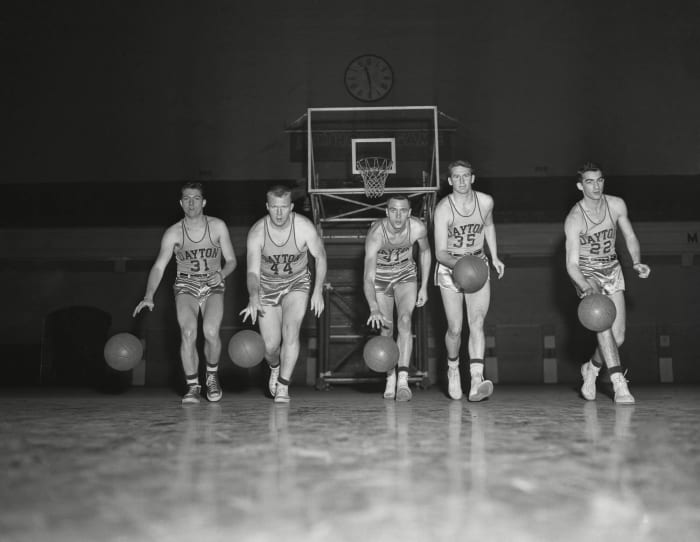
We don’t know if Meineke has anything to do with the auto care company, but he is the first winner of the NBA Rookie of the Year award. This was the 1950s — 1953 was when he won, to be specific — and basketball was different. Meineke was picked in the second round, and was also picked No. 12 overall. He began his career for the Pistons… the Fort Wayne Pistons. Meineke was born in Dayton, went to college at Dayton, and in 2013, died in Dayton. In his first season he averaged 10.7 points and 6.9 rebounds per game at a time when, you know, there weren’t all that many rookies. Meineke is the guy in the middle of the photo, in case you don't recognize him on sight.
1953-54: Ray Felix
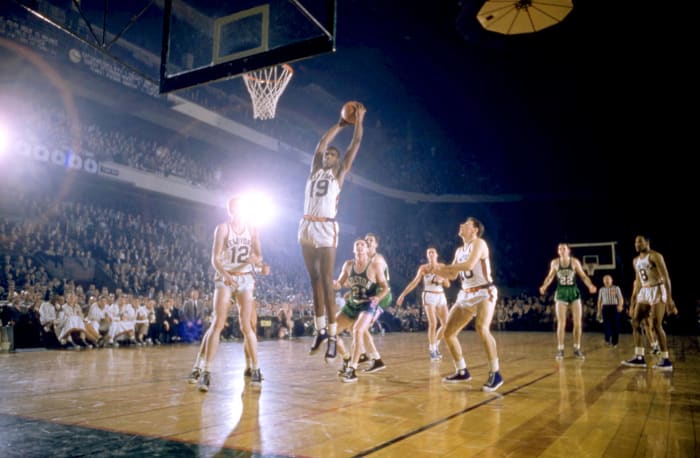
Felix was drafted first overall out of that venerated basketball institution Long Island University. He hit the ground running for the Baltimore Bullets, averaging 17.6 points and 13.3 rebounds per game. Felix made the All-Star Game as well, though that would be his only appearance. The Bullets were about to fold, so after his rookie season the center was dealt to the Knicks, where he had several good seasons before ending his career with the Lakers.
1954-55: Bob Pettit

If you are the sort to look through NBA history and record books — and if you are reading this, there is a good chance you are — then you know Pettit’s name, as he pops up quite often. One of the NBA’s first stars, in addition to winning the third Rookie of the Year award, he was the first player to win the MVP award when it was introduced in 1956 (he would win again in 1959). Pettit also was the first NBA player with over 20,000 career points. While he played the bulk of his career with the St. Louis Hawks, who would move to Atlanta after he retired, as a rookie he played in the final season of the Milwaukee Hawks. He hopped in the league and averaged 20.4 points per game, which would actually be the lowest of his Hall of Fame career.
1955-56: Maurice Stokes

Pettit is one of those old-school Hall of Fame names many people know, but Stokes also made the Hall, although his is a story of supreme tragedy. Stokes was an all-star in all three of his NBA seasons, and led the NBA with 16.3 rebounds per game as a rookie. On the last day of the 1957-58 regular season, Stokes was knocked unconscious when his head hit the court. These were olden times, so he stayed in the game, and then played in the first playoff game for the Royals. Flying back to Cincinnati, he became ill, and would soon thereafter suffer a stroke. He had post-traumatic encephalopathy, a brain injury that left him paralyzed. For years, his teammate Jack Twyman was his legal guardian, until Stokes’ condition deteriorated to the point he needed around-the-clock medical care. Stokes died at the age of 36. The NBA’s Twyman-Stokes Teammate of the Year award is now given in both of their memories.
1956-57: Tommy Heinsohn
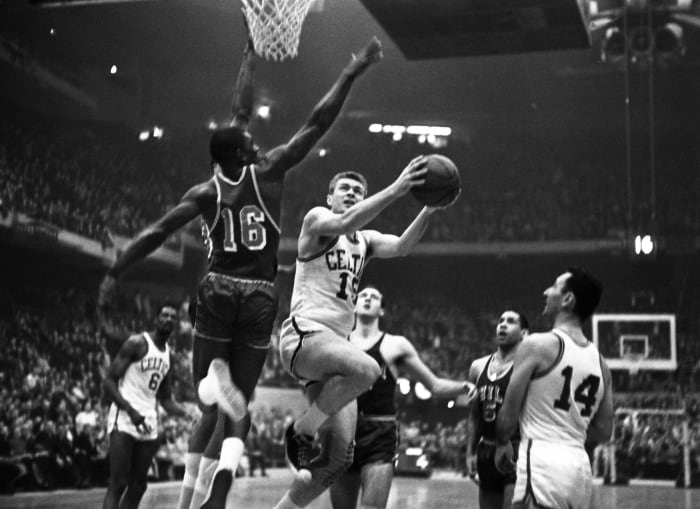
Think of how many icons the Boston Celtics have as a franchise. It’s Heinsohn, though, who became known as “Mr. Celtic.” That was partially due to his play, including being an all-star as a rookie, when he put up 16.2 points and 9.8 rebounds per game. He was a six-time all-star and won eight rings in his nine seasons with the Celtics (that’s some early NBA stuff right there). Then, Heinsohn coached the Celtics nine seasons and won two more titles. After that, he spent 30 years as the local color commentator on Celtics broadcasts where he became famed for his, um, unbridled enthusiasm for all things Celtics. Truly, an icon among icons in Boston.
1957-58: Woody Sauldsberry
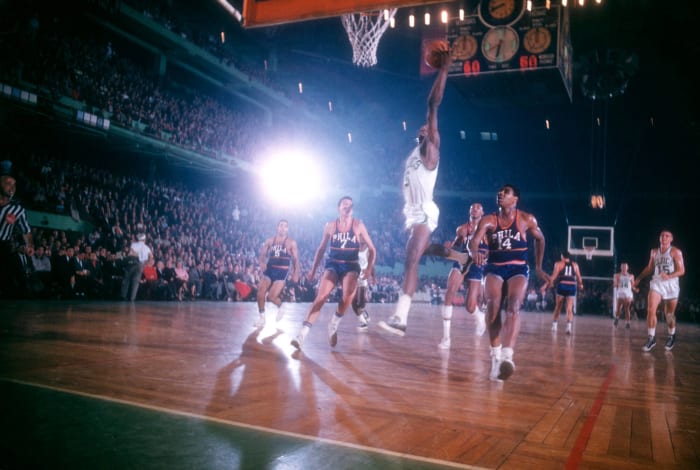
Sauldsberry’s win after the 1957-58 season is sandwiched between several Hall of Famers, which makes him stand out in a sense. He took an interesting path to the NBA. Out of college, he spent two years with the Harlem Globetrotters before he was drafted by the Philadelphia Warriors, seemingly as an afterthought. He was the 60th pick of the NBA Draft, which at the time meant he was taken in the eighth round. The flyer from Philly worked out, as Sauldsberry averaged 12.8 points and 10.3 rebounds per game. He’d post another double-double campaign and be an all-star the next year, before settling into a journeyman career of solid contribution.
1958-59: Elgin Baylor
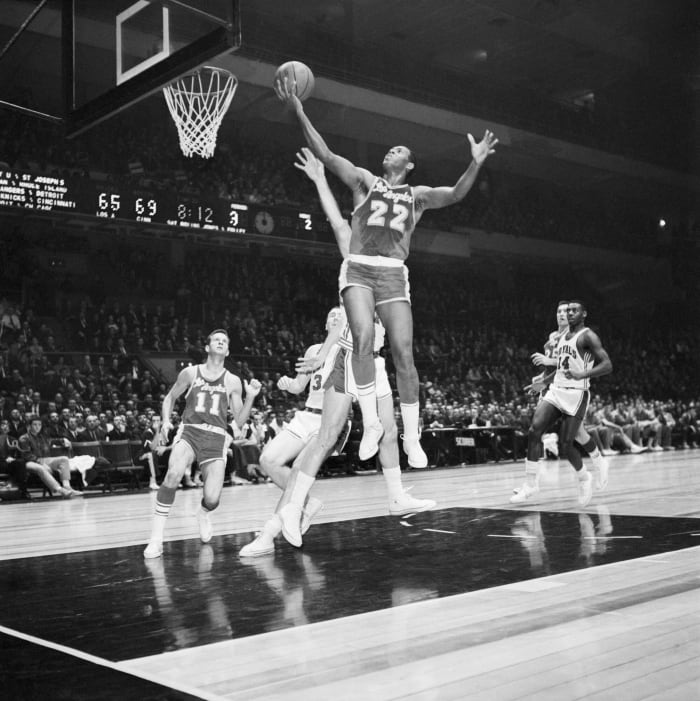
One of the best players to never win an MVP, Baylor was one of the first Los Angeles Lakers legends. He spent his first two seasons with the team when they were still in Minneapolis, though. The future member of the top 50 and top 75 players lists, Baylor averaged 24.9 points and 15.0 rebounds per game as a rookie, with 4.1 assists per game for good measure. Of course, he would eventually average a whopping 38.3 points per contest. And yet, he never won an MVP.
1959-60: Wilt Chamberlain
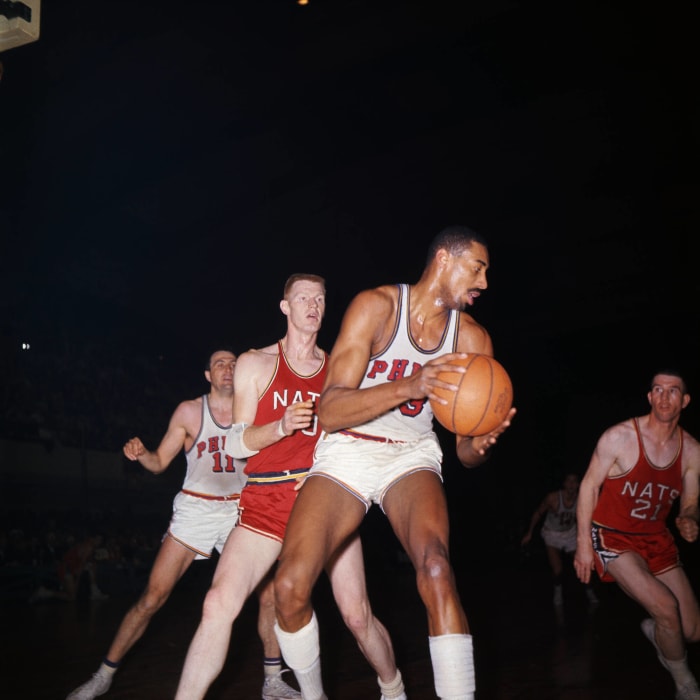
It probably didn’t help Baylor in his MVP quest that Chamberlain debuted one season later. A true stat stuffer that helped changed the NBA, Wilt won not only Rookie of the Year in 1960, but also the MVP. Yes, he won both at the same time. His numbers are almost unfathomable. In his first season with the Philadelphia Warriors he averaged 37.6 and, get this, 27.0 rebounds per game. Eventually, as you likely know, he’d score 100 points in a game. He’d also win a few more MVPs.
1960-61: Oscar Robertson
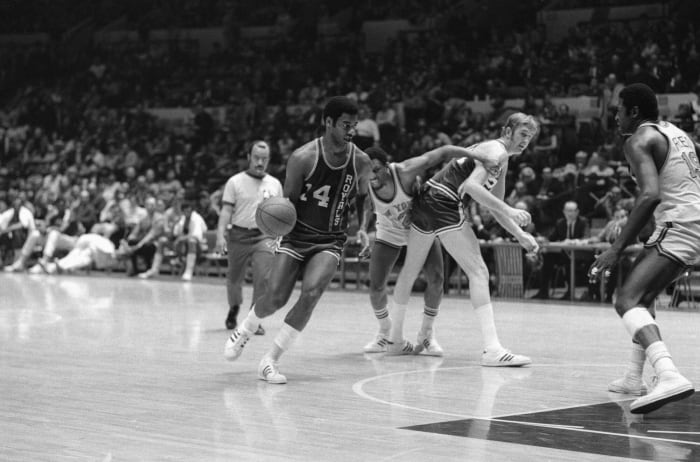
Before Russell Westbrook made it almost passé, Robertson made history when he averaged a triple-double for a full season. However, he waited all the way until his sophomore season to do that. As a rookie with the Cincinnati Royals he came close, though! “The Big O” averaged 30.5 points and 10.1 rebounds per game, but only a mere 9.7 assists per contest. Way to slack, Robertson!
1961-62: Walt Bellamy

Drafted in 1961, Bellamy serves as a reminder that the early ‘60s were still a different era for the NBA, as he was taken first overall by the Chicago Packers. They became the Zephyrs, who became the Baltimore Bullets, who moved to Washington and, eventually, became the Wizards. Bellamy is in the Hall of Fame, but his rookie season was his best campaign. He averaged highs in points (31.6) and rebounds (19.0). However, he would make the All-Star Game in the next three years as well.
1962-63: Terry Dischinger
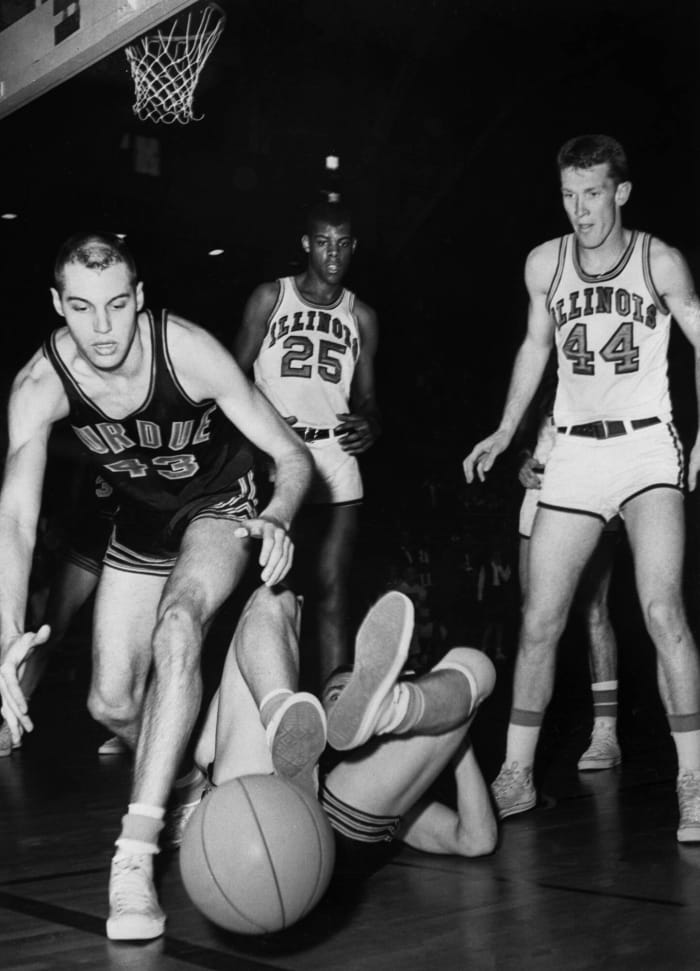
Dischinger is also sandwiched between many a future Hall of Famer. Also, he joined forces with Bellamy on what was now called the Chicago Zephyrs. A star at Purdue — he’s in the College Basketball Hall of Fame at least — Dischinger averaged 25.5 points per game as a rookie. In fact, he had three good seasons, but then left the NBA to serve in the military during the 1960s. When he returned, he wasn’t the same player, even if he played another six seasons.
1963-64: Jerry Lucas

Lucas was a star time and time again. In high school, he was Mr. Basketball two times over. In college, he was a first-team All-American three times over. As a rookie with the Royals he averaged over 17 points and rebounds per game. He then averaged 20/20 for two campaigns in a row. Though Lucas was never an NBA MVP, he was All-NBA five times and made it to the Hall.
1964-65: Willis Reed
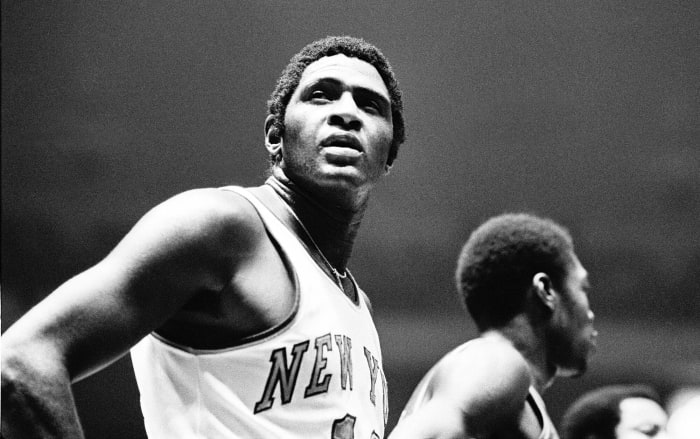
Reed’s most famous moment came in a game that he barely played in, but he had quite the career aside from that. A life-long Knick, Reed put up 19.5 points and 14.7 rebounds per contest as a rookie. In 1970 he was MVP, and also first-team All-Defense. Oh, and he was Finals MVP for a title-winning team in New York. Even though he had a pretty bad thigh injury you may have heard about.
1965-66: Rick Barry

Sure, he shot free throws underhand (and led the NBA in free throw percentage seven times, by the way), but Barry was a great player beyond that quirk. As a rookie with the San Francisco Warriors, Barry scored 25.7 points per game. The next year he averaged 35.6 points to lead the NBA, before he took off for the ABA for several seasons. When he retired, Barry was a five-time All-NBA first teamer, and a four-time All-ABA first teamer.
1966-67: Dave Bing

Before there was Isiah and Joe, there was Dave Bing. Sure, he didn’t win a title with the Pistons, but over nine seasons he became a star for the franchise, which retired his number. In the 1966-67 season, Bing won Rookie of the Year, and followed up by being the scoring champ the next season. While he played for Washington and Boston later in his career, Bing solidified his connection to the Motor City when he served as the mayor of Detroit from 2009 until 2014.
1967-68: Earl Monroe
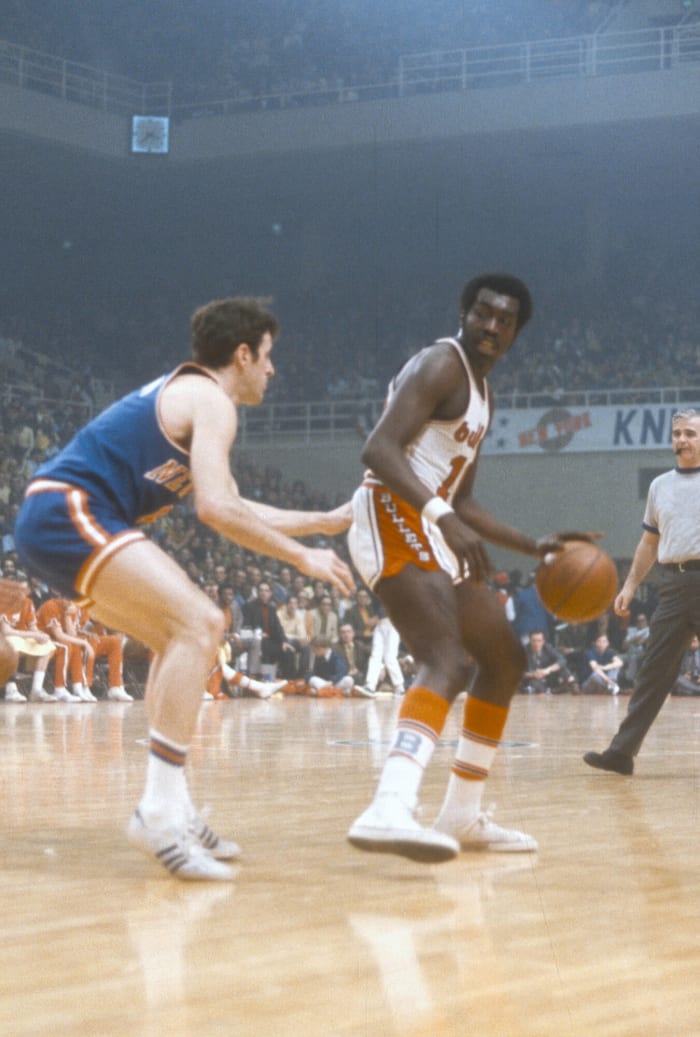
Famously, “Earl the Pearl” once said, “The thing is, I don't know what I'm going to do with the ball, and if I don't know, I'm quite sure the guy guarding me doesn't know either.” A fun, flashy player, Monroe dropped 56 points in a game once as a rookie, helping him average 24.3 points per game for the Baltimore Bullets. He would spend most of his career with the Knicks, which certainly helped raise the future Hall of Famer’s profile, but he was a star with Baltimore as well.
1968-69: Wes Unseld

Interestingly, Unseld is the fourth Rookie of the Year in a row who was drafted second overall. A lot of teams picking first ended up missing out! Unseld also happened to be taken by the Baltimore Bullets, which means he joined forces with Monroe. However, Unseld ended up one-upping his teammate. Not only did his 13.8 points and 18.2 rebounds per game help him win Rookie of the Year, he was also named MVP. To date, only Unseld and Chamberlain can claim that double whammy.
1969-70: Lew Alcindor
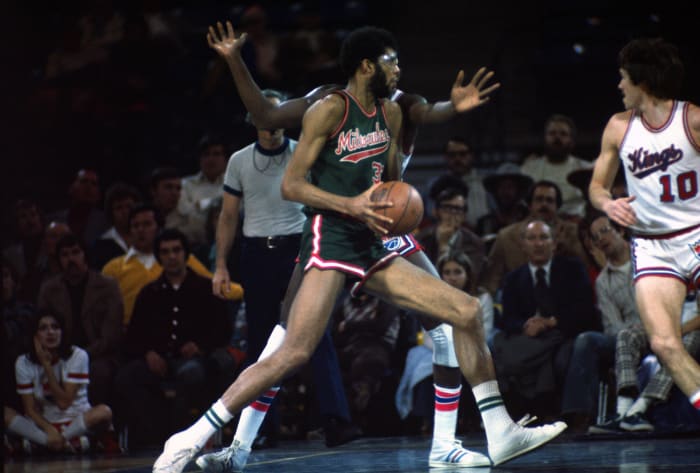
Well, there was no way the Bucks were going to let Lew Alcindor make it past the first-overall pick in 1969. An absolute wrecking force in college at UCLA, Alcindor carried that over to the pros. He averaged 28.8 points and 14.5 rebounds per game as a rookie. In his second season he led the league in scoring and led the Bucks to a title. Of course, later in his career, Alcindor would convert to Islam and change his name. You now know him as Kareem Abdul-Jabbar.
1970-71: Dave Cowens and Geoff Petrie

The question is, does this joint victory end our Hall of Famer streak? Cowens is in the Hall, but Petrie is not. Playing for the Celtics, Cowens averaged 17 points and 15 rebounds per game. He’d win an MVP in 1973 and take home titles in Boston in 1974 and 1976. Petrie, a Princeton grad, averaged 24.8 points per game for the Trail Blazers, but the guard didn’t provide much but scoring. He made two All-Star Games, but his career was cut short by a knee injury. Petrie’s number was retired in Portland, though, and he is a two-time Executive of the Year thanks to his time with the Sacramento Kings.
1971-72: Sidney Wicks
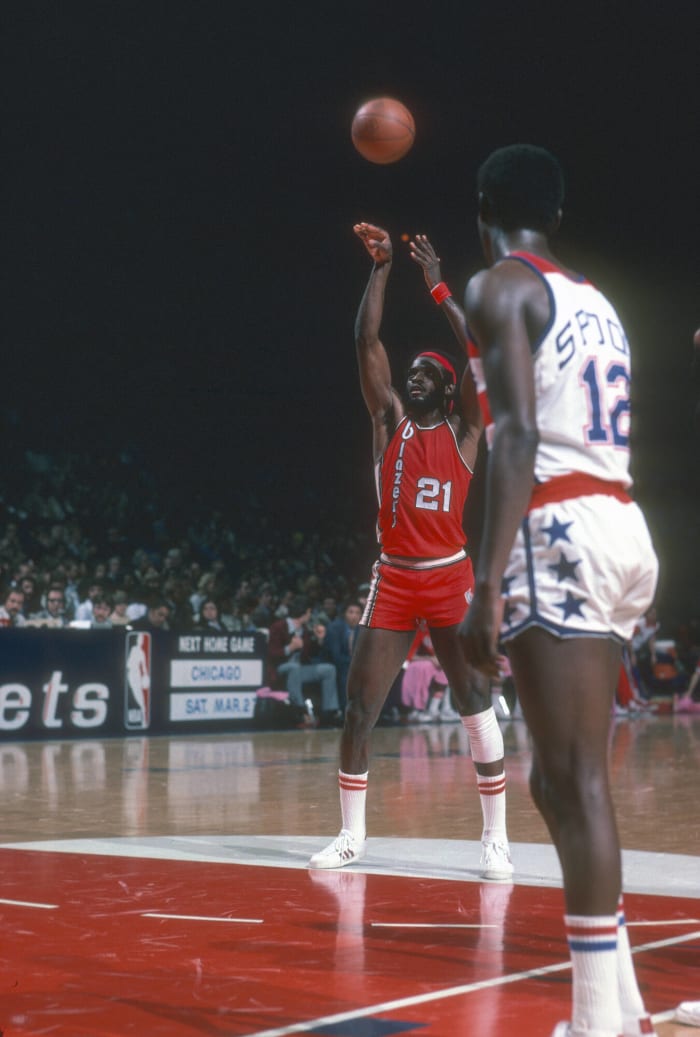
However you slice it, Wicks definitely ends the run of Hall of Famers, although he doesn’t end our run of Trail Blazers, as he joined Petrie in Portland. A three-time college champ, playing at UCLA in the John Wooden era had its perks. Wicks averaged 24.5 points and 11.5 rebounds per game during the 1971-72 seasons. He also made the All-Star Game, a feat he would repeat the next three seasons as well. For whatever reason, his shooting form started to dissipate as his career went on, so a Hall of Fame trajectory ended up with Wicks in the proverbial “Hall of Very Good.”
1972-73: Bob McAdoo

Interestingly, McAdoo wasn’t named to the NBA’s 50-man 50th anniversary team, but did make the cut for the 75th anniversary which, naturally, consisted of 76 players. The Hall of Famer deserved the acknowledgement, though. His rookie season for the Buffalo Braves was actually not amazing, though 18.0 points and 9.1 rebounds per game is nothing to quibble about. However, McAdoo then took a leap and led the NBA in scoring for three seasons in a row, winning one MVP in the process.
1973-74: Ernie DiGregorio

What is it with teammates winning back-to-back Rookie of the Year awards? DiGregorio followed in the footsteps of McAdoo, but he had a different game. The point guard averaged 15.2 points, but also led the NBA with 8.2 assists per contest in the 1973-74 season. That included a 25-assist game that remains a rookie record. Unfortunately, DiGregorio suffered a bad knee injury early in his career and he never seemed to fully regain his form. He only played six seasons, and only managed to play over 40 games three times.
1974-75: Jamaal Wilkes

Titles followed Wilkes wherever he went, although in some ways he made choices that made it easier to make that happen. After all, he won two titles in college, but he went to play for John Wooden at UCLA. Although, he was a two-time All-American, so he was a contributor. Then, the now-Golden State Warriors drafted him and Wilkes won Rookie of the Year averaging 14.2 points and 8.2 rebounds per game. He was also always known for his stout defense, making two second-team All-Defense squads. Wilkes would win four NBA titles, one with the Warriors, and then three with the Lakers. Those Lakers teams apparently had a couple guys named Magic Johnson and Kareem Abdul-Jabbar who were quite good.
1975-76: Alvan Adams
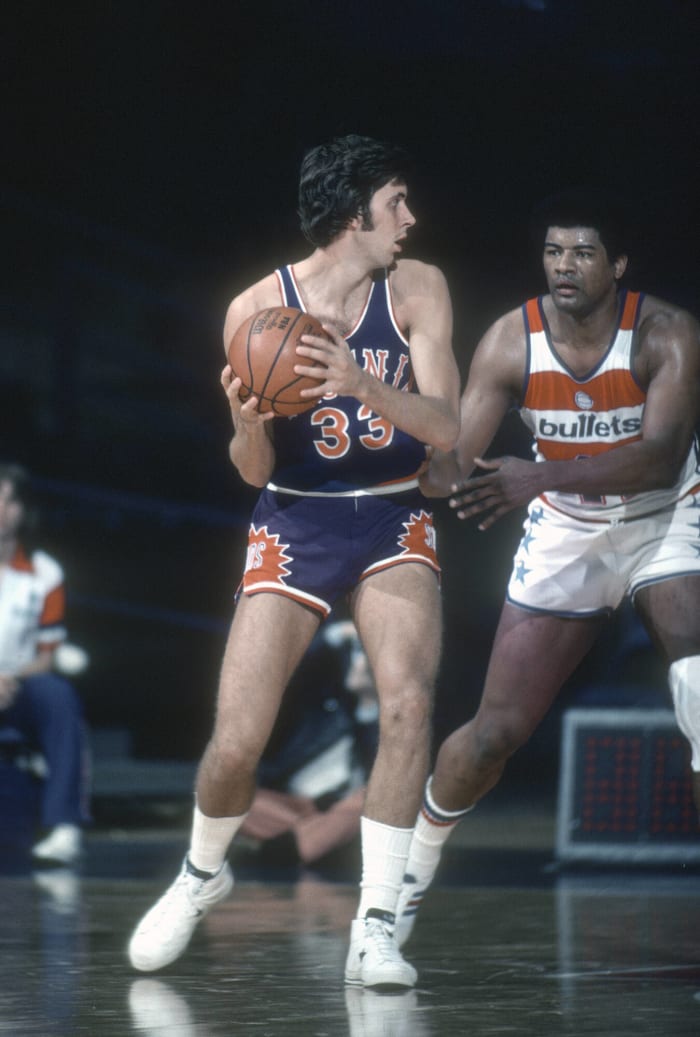
Adams was the first Phoenix Sun to win Rookie of the Year. The 1975-76 season was quite a pleasant surprise for the Suns, in fact. An expansion team for the 1968-69 season, they hadn’t had much success, and even this year they finished 42-40. Then, they made a magical run to the NBA Finals, though they lost to the Celtics. As for Adams, he was an all-star as a rookie, but that was the only time. However, he played for the Suns all the way through the 1987-88 campaign, becoming one of those guys beloved by a franchise’s fans, if not a household name.
1976-77: Adrian Dantley

The Buffalo Braves were only around from 1970 through 1978 (they would become the Clippers), but they had three players win Rookie of the Year. Of course, they were all top-six picks, so perhaps that speaks to recurring futility on the court. Dantley, like McAdoo, would go on to be a Hall of Famer. He actually only spent his rookie campaign with Buffalo, becoming something of a journeyman Hall of Famer (he played for seven franchises total). Dantley averaged 20.3 points per game as a rookie and would later lead the NBA in scoring twice.
1977-78: Walter Davis

Davis, like Alvan Adams, would spend many years with the Suns, although Davis would make six All-Star Games to Adams’ one. In fact, having played in over 1,000 games and having averaged 18.9 points per contest in his career, Davis is a guy who is probably overlooked these days. As a rookie, he averaged a career-high 24.2 points per game, and his number six was retired by the Suns.
1978-79: Phil Ford
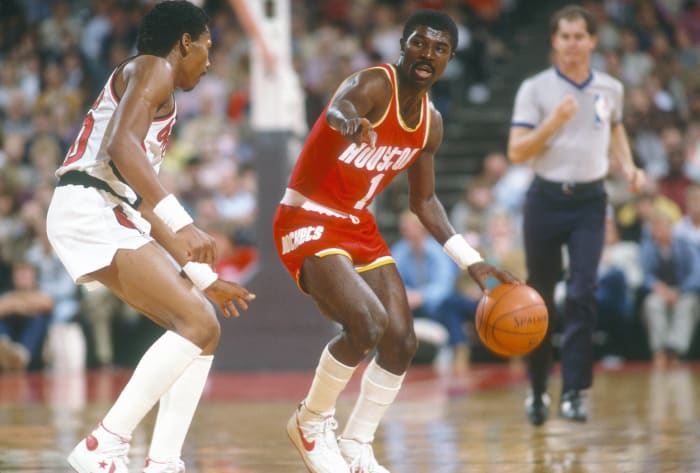
A teammate of Davis’ at North Carolina, Ford had the better college career, winning the Wooden in 1978, the same year he was drafted second overall. His pro career was decidedly less remarkable, though. The point guard won Rookie of the Year and was All-NBA second team, even though he wasn’t an all-star. In fact, Ford never made an All-Star Game, and he’s more remembered for his college exploits than his pro game.
1979-80: Larry Bird

If you watched “Winning Time” — and based on the fact it was canceled after two seasons, odds are you didn’t — then you know Bird won Rookie of the Year over Magic Johnson. It continued their collegiate rivalry, and both were deserving candidates as rookies. Bird is remembered for his shooting acumen and scoring prowess, but he actually was a 20/10 guy for the first six seasons of his career. The French Lick sharpshooter managed 21.3 points, 10.4 boards, and even 4.5 assists as a rookie out of Indiana State. Of course, he’d go on to win three MVPs and become a legend of the game.
1980-81: Darrell Griffith

Sure, he was never an all-star, but Griffith was known as “Dr. Dunkenstein,” so he will always have that. Griffith led Louisville to an NCAA title while winning the Wooden before the Jazz, the only NBA team he would ever know, made him the second-overall pick. The good doctor would average 20.6 points per game as a rookie, though he was something of an empty-calories scorer and poor shooter early in his career. Of course, he brought the dunks, so all was forgiven.
1981-82: Buck Williams
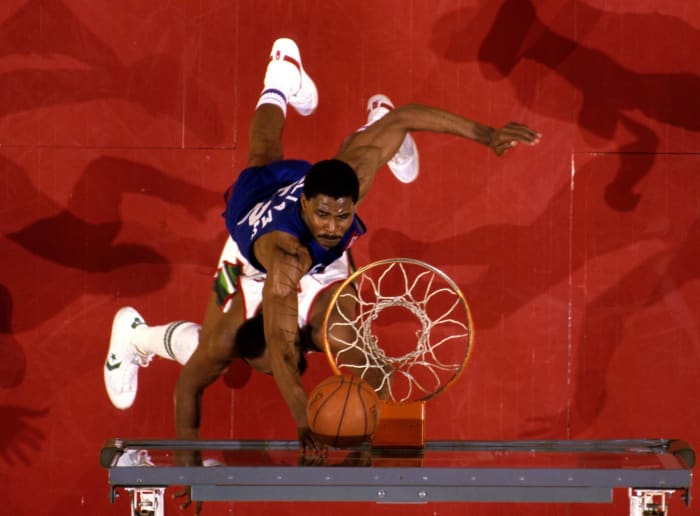
With the New Jersey Nets, Williams was a double-double factory. He averaged over 12 boards per game in each of his first six seasons, and as a rookie he also averaged 15.5 points per contest. With the Nets, Williams was a three-time all-star, but then he moved to the Trail Blazers in the 1990s and remade himself. Now a complementary player, Williams made first-team All-Defense twice, and second team once. Then, he went and added a couple seasons with the Knicks for good measure. Williams would end up playing in a whopping 1,307 NBA games over 17 seasons.
1982-83: Terry Cummings
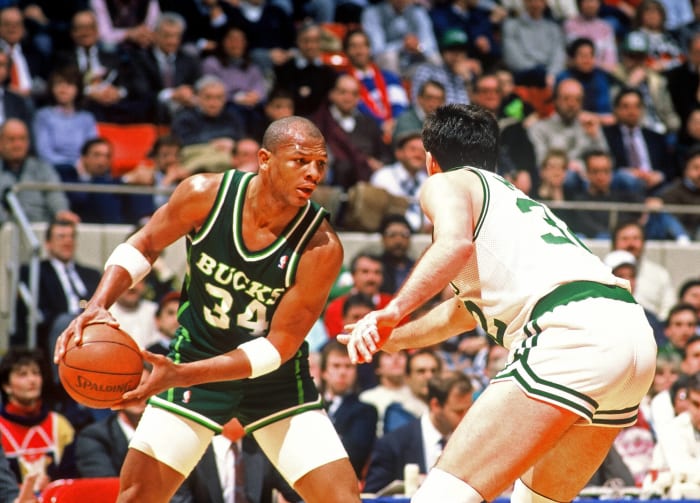
If you think Williams had longevity, Cummings was in the NBA from 1982 until the year 2000! Although, to be fair, injuries led to him playing in only 1,183 games. However, this is about that 1982-83 season, when Cummings won Rookie of the Year thanks to 23.7 points and 10.6 rebounds per game for the San Diego Clippers. He averaged over 20 points in seven of his first eight seasons — and 19.8 the other season — before he, you know, hung around for a decade more and averaged like eight points and 15 minutes a game.
1983-84: Ralph Sampson

It’s hard on the human body to stand 7’4’’, and in the 1980s they did not have the same medical knowhow and physical training they have today. Sampson was a star in college. He won two Woodens, three Naismiths, and three AP Player of the Year awards. That led to him being the first-overall pick by the Rockets. He started his career quite well. As a rookie he averaged 21.0 points, 11.1 boards, and 2.4 blocks per game. Sampson was an all-star in each of his first four seasons, but then his knees gave out on him. His early NBA career, plus his college success, was enough to get him into the Basketball Hall of Fame, though.
1984-85: Michael Jordan

Hakeem Olajuwon worked out as a pick for the Rockets. Sam Bowie? Well, injuries happen. The Bulls, though, will forever be overjoyed Jordan lasted until the third pick in the 1984 NBA Draft. What can we say that hasn’t been said? We will note that he averaged 28.2 points, 6.5 rebounds, 5.9 assists, and 2.4 steals per game as a rookie. Then, he went on to become, at worst, the second-best player in NBA history. Oh, and he brought the Bulls six rings.
1985-86: Patrick Ewing
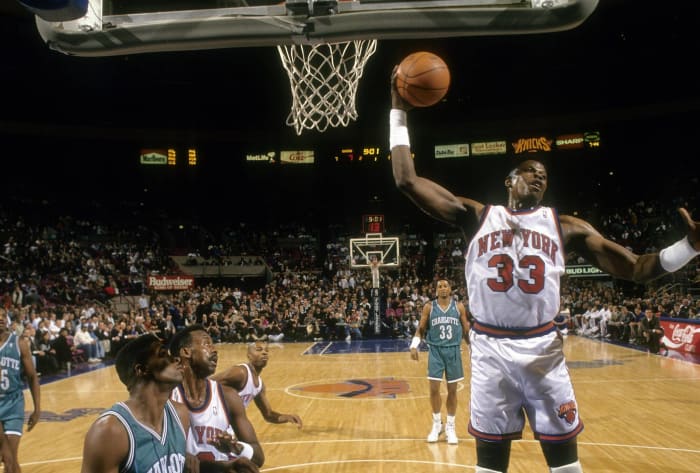
On the flip side of MJ, Ewing is in the running among the best players to never win a ring. He made 11 All-Star Games and is a New York Knicks icon. Ewing just never managed to win a title. Of course, he did win Rookie of the Year averaging an even 20 points and nine rebounds per contest. Plus, Ewing remains at the center of one of the foremost NBA conspiracies. Then again, MJ has a couple of those two. We guess Ewing will always be in Jordan’s shadow.
1986-87: Chuck Person
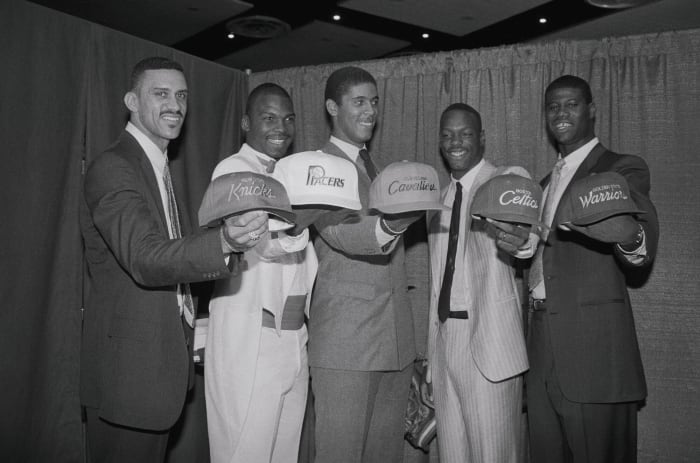
After three Hall of Famers we get to “The Rifleman,” who was, for his era, an accurate three-point shooter. Never an all-star, Person averaged 18.8 points and 8.3 rebounds as a rookie, which was the kind of player he was for several seasons. Never more than a solid player, after his playing career he got into coaching. That ended when Person was at the center of the NCAA corruption scandal of 2017-18, which led to his ouster from his alma mater Auburn.
1987-88: Mark Jackson
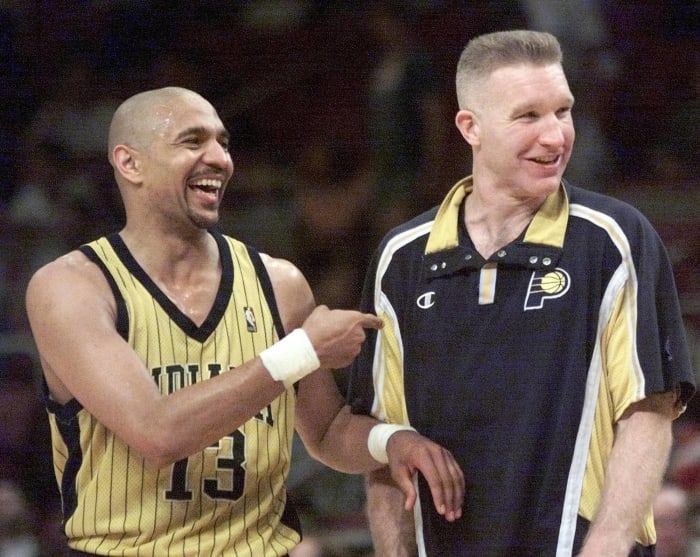
Known to a generation primarily as an announcer, Jackson went from playing high school ball in Brooklyn to playing at St. John’s in college to being drafted by the Knicks. A pass-first point guard, Jackson averaged 13.6 points and 10.6 assists as a rookie. The next year he would be an all-star, and later he would lead the NBA in assists for a season. He’s actually sixth in career assists, with only Russell Westbrook having the potential to catch him.
1988-89: Mitch Richmond
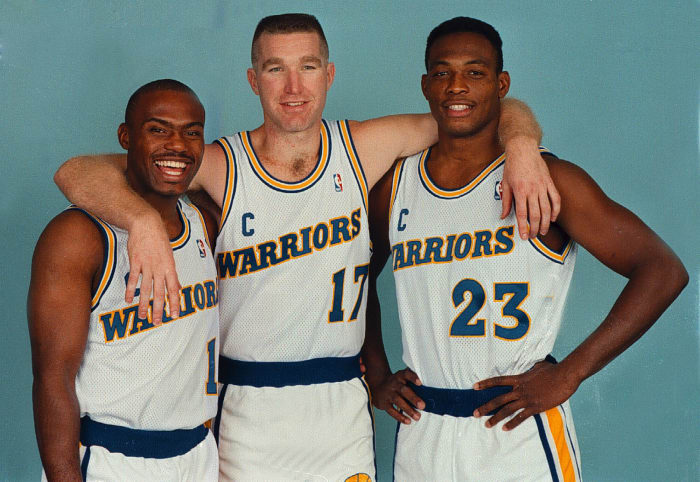
When it comes to the Hall of Fame, there is a common opinion, perhaps even a general consensus, that Richmond is the most-borderline inclusion among NBA players. There is definitely a, “Really, he’s a Hall of Famer?” feel to a player that many NBA fans remember seeing play for years, as opposed to some of the Hall inductees from the ‘60s and ‘70s. That being said, Richmond did win Rookie of the Year with Golden State, and he did make six All-Star Games. He also averaged over 20 points per game for 10 straight seasons, including his rookie campaign. Maybe you don’t think he’s a Hall of Famer, but Richmond was quite good.
1989-90: David Robinson

The Spurs drafted Robinson first overall in 1987, but then had to wait a couple years for “The Admiral” to complete his naval duty. It was worth it. As a rookie he averaged 24.3 points, 12.0 rebounds, and a whopping 3.9 blocks per game. He made the All-Defense second team, and later he would make the first team four times and be named Defensive Player of the Year. Robinson also took home two titles with the Spurs before retiring a legend of the game.
1990-91: Derrick Coleman
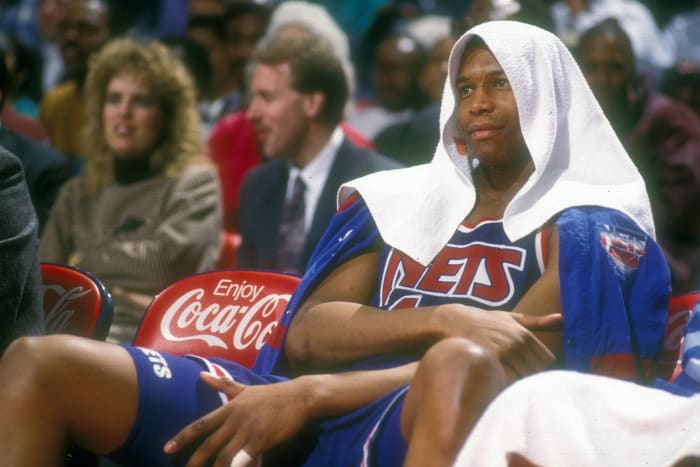
Robinson kicked off a string of five straight first-overall picks winning Rookie of the Year. That’s good drafting! However, while three of those five players have ended up in the Hall, Coleman isn’t one of them. The idea was that Coleman could be Charles Barkley with a three-point shot, but he didn’t quite pan out like that. He had issues with injuries, and many questioned his dedication to the game. Coleman won Rookie of the Year off of 18.4 points and 10.3 rebounds per game, but he peaked in 1994 when he made his sole All-Star Game and was third-team All-NBA.
1991-92: Larry Johnson
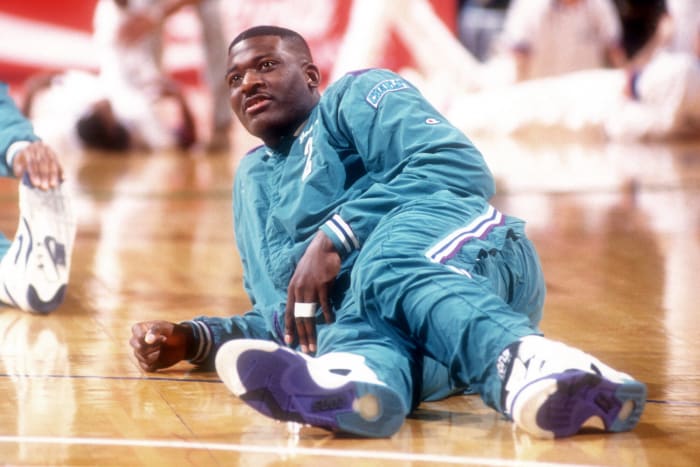
With his dynamic dunks, Johnson became one of the faces of the NBA when he was a Charlotte Hornet. He even made the cut for “Space Jam!” The consensus college player of the year in 1991, Johnson followed that up by winning Rookie of the Year in 1992. He made the All-Star Game in 1993, when he was also second-team All-NBA. While Johnson made one more All-Star appearance with the Hornets, after five years with the team he moved to the Knicks, where he became more of a secondary, even tertiary piece of the puzzle. The star player was gone.
1992-93: Shaquille O’Neal

Physical forces like Shaq don’t come around all that often. Sure, he did some weird ring chasing late in his career (even though he already had four of them), but he was as formidable on the court as anybody at his peak. Right from the get-go, he averaged 23.4 points and 13.9 rebounds per game with the Magic. Shaq made the All-Star Game, his first of 15 appearances. Yes, some of that was built on his celebrity later in his career, but he became a celebrity, and a Hall of Famer, because he was the kind of mix of size and skill who could, say, win Finals MVP three seasons in a row.
1993-94: Chris Webber

Webber, the gem of the “Fab Five” at Michigan, was also taken first overall by the Orlando Magic. However, before he played a game with them he was dealt to the Golden State Warriors, with the Magic grabbing Penny Hardaway in the process. While Webber won Rookie of the Year with the Warriors, the trade didn’t necessarily work out great for Golden State. Webber cajoled his way off the team after his first season, landing with Washington. There, he was fine, but it is when he moved to the Sacramento Kings that he became a star, and built the bulk of his Hall of Fame resume.
1994-95: Grant Hill and Jason Kidd
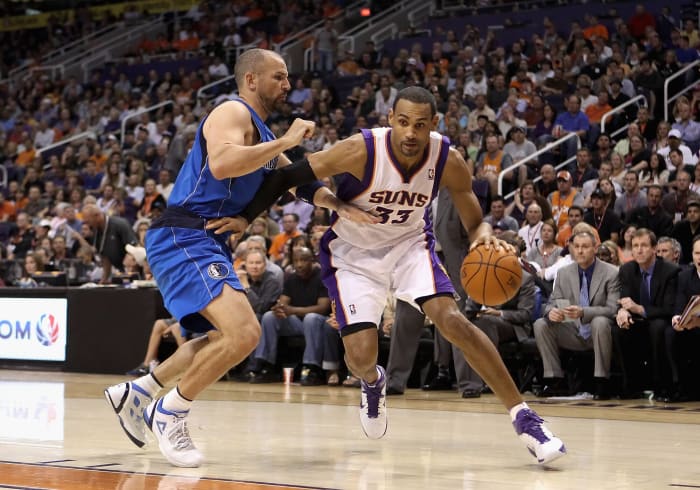
Yes, another tie, but this time between two Hall of Famers. Hill was a do-it-all point-forward type. As a rookie for the Pistons, he averaged 19.9 points, 6.4 rebounds, and 5.0 assists per game. After six years as a star in Detroit, Hill seemed like a future Hall of Famer. Then, his time with Orlando was marred by injury, but he persevered and stuck around long enough to make the Hall. Personally, we think Hill was better than Kidd as a rookie, as Kidd averaged 11.7 points and 7.7 assists for the Mavericks. He didn’t have a shot at the time — he would later learn to shoot the three — but would remain an elite passer. Kidd led the NBA in assists five times.
1995-96: Damon Stoudamire
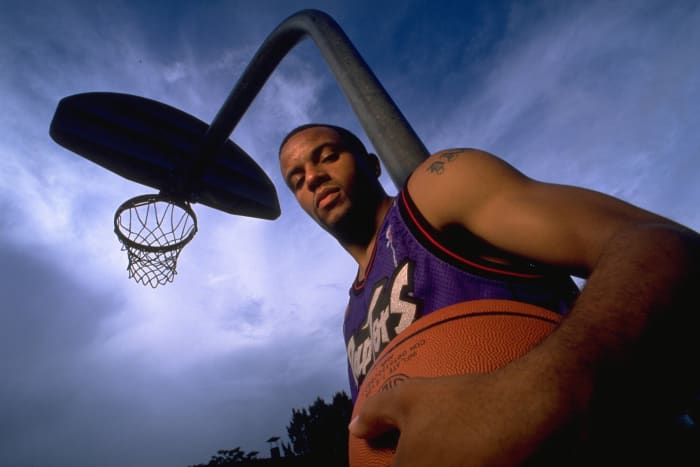
Stoudamire is sandwiched between three years of Hall of Famers winning before him, and likely three years of Hall of Famers after him. Given the future winners coming up, it seems likely he will be the last such outlier for a long while. Stoudamire was the first-ever pick of the Toronto Raptors franchise. While fans in Toronto booed him, the pick paid off, with the point guard averaging 19.0 points and 9.3 assists per game. He never made an All-Star Game, either with the Raptors or the Blazers, his primary team, but he had a long career in the NBA. Having gotten into coaching, he’s now the head man at Georgia Tech.
1996-97: Allen Iverson

Like Stoudemire, Iverson was an undersized point guard. The difference is that nobody got buckets like A.I. did. Even as a rookie for the Sixers, Iverson averaged 23.5 points per game, but he was just getting started. He led the NBA in scoring four times, and steals three times for good measure. An 11-time all-star, Iverson was one of the faces of basketball around the turn of the millennium.
1997-98: Tim Duncan

The Spurs were bad for one year and they got a gift. San Antonio won the NBA Draft lottery and got to pick Duncan to pair with Robinson. Right away, Duncan averaged over 20 points, 11 boards, and two blocks per game, making the second All-Defense team as well. Later, Duncan would win two MVPs, and become the bridge of two great eras for the Spurs. He would end up winning five titles in San Antonio.
1998-99: Vince Carter
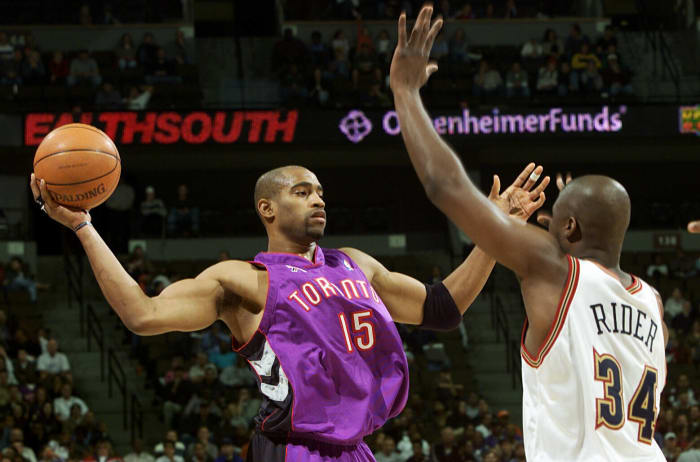
Carter will be a Hall of Famer. He just played so long that it hasn’t happened yet. Debuting in 1998, Carter played all the way until 2020. He’s third in all-time games played in NBA history. Of course, prior to being known for his longevity, “Half Man, Half Amazing” was known for his dunking prowess with the Raptors. He averaged a solid 18.3 points per game as a rookie, but that included some of those dunks that made him a legend.
1999-2000: Elton Brand and Steve Francis

To date, the last double winner. Brand was taken first, and Francis second, and apparently there wasn’t enough separation between them. Playing for the Bulls, Brand averaged 20.1 points and 10.0 rebounds per game. After two seasons in Chicago, he moved to the Clippers, where he made two All-Star Games. Francis, famously, was drafted by the Vancouver Grizzlies, but sulked his way into a trade to the Rockets before even playing a game. He averaged 18.0 points, 6.6 assists, and 5.3 rebounds as a rookie. Francis ended up a three-time all-star.
2000-01: Mike Miller

The 2000 NBA Draft was one of the worst ever, leading to Miller emerging as Rookie of the Year against a weak field. He built a career as a journeyman supporting piece, so it is fitting the only other award he ever won was Sixth Man of the Year. Speaking of a bad rookie class, Miller averaged 11.9 points per game for the Magic, and that was good enough. He did make 40.7 percent of his threes, though.
2001-02: Pau Gasol
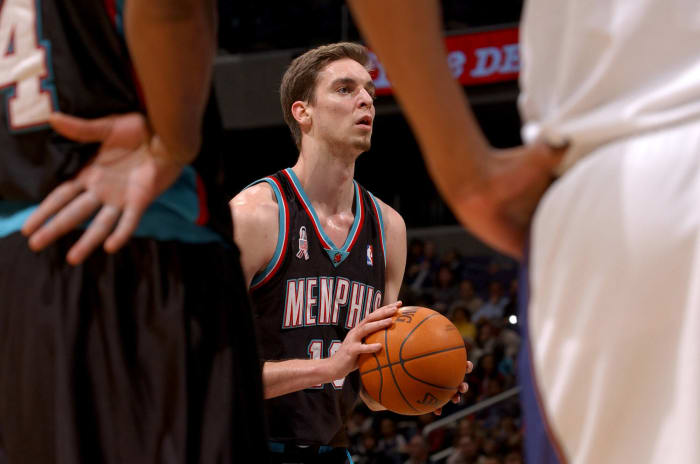
Gasol made history, as he became the first non-American to win NBA Rookie of the Year. Playing for the now-Memphis Grizzlies, the Spaniard averaged 17.6 points, 8.9 rebounds, and 2.1 blocks per game. While he was very good with the Grizzlies, after he was dealt to the Lakers to join forces with Kobe Bryant — wouldn’t you know it — suddenly he was making All-Star Games and All-NBA teams. Pau won two titles in Los Angeles, which probably helped bolster his Hall of Fame credentials. Gasol is also, at this moment, the last Hall of Famer on this list, but that will assuredly change.
2002-03: Amar’e Stoudemire

Stoudemire also made history, as he was the first player drafted out of high school to win Rookie of the Year. A member of the iconic “Seven Seconds or Less” Suns, Amar’e showed promise as a rookie, averaging 13.5 points and 8.8 rebounds per game. He broke through in his sophomore season, and he would end up making six All-Star Games and five All-NBA teams (one first-team selection). His last selection came in his first season with the Knicks, but instead of being the new face of the famed franchise, Stoudemire’s knees gave out on him. He hung around for a bit, but was never the same player.
2003-04: LeBron James

LeBron is the first active player on this list, perhaps holding out hope to play alongside his son Bronny in the NBA. Drafted by his hometown Cleveland Cavaliers, LeBron was inefficient as a rookie, and his shot was a little dicey. Also, he was a teenager, and it didn’t matter. James averaged 20.9 points, 5.5 rebounds, and 5.9 assists per game. He’d become, you know, the only true challenger to Jordan as the best player of all time, and also the NBA’s all-time leading scorer in terms of career points.
2004-05: Emeka Okafor

Drafted second overall by the expansion Charlotte Bobcats, playing for an expansion team gave Okafor the chance to stretch his legs. Plus, as a guy drafted as a junior, he was a bit more NBA ready than the first-overall pick, Dwight Howard. The UConn alum averaged a career-high 15.1 points and 10.9 rebounds per game as a rookie. A double-double guy for several years, Okafor was never an all-star, and really just more of a pretty good player.
2005-06: Chris Paul

Paul is another guy you can already etch in stone as a Hall of Famer. “The Point God” is third in all-time assists, and has the chance to surpass Kidd for second. Debuting for the New Orleans Hornets, Paul averaged 16.1 points and 7.8 assists as a rookie. That’s on the low end for him in terms of dimes. Five times Paul has led the NBA in assists per game, and for good measure has led in steals six times.
2006-07: Brandon Roy

Roy is a case of “What could have been?” unfortunately. He debuted with the Trail Blazers and won Rookie of the Year off of 16.8 points per game on efficient shooting, with four assists and rebounds per contest as well. Roy then was an all-star in each of the next three seasons. Unfortunately, Roy’s knees were not built for being a professional athlete. He underwent arthroscopic surgery on both of his knees in January 2011, and then after the season he announced he was retiring because of the condition of his knees. Roy was able to return to play five games for the Timberwolves, but that was it.
2007-08: Kevin Durant

Granted, he joined the Warriors to form a title-winning “super team” to get his rings, but Durant was a key part of those teams, as his two Finals MVPs attest to. Durant is a surefire Hall of Famer, a four-time scoring champ, and also a tie to a bygone era of basketball. When Durant won Rookie of the Year, he did it for the Seattle Supersonics. The next season, they were the Oklahoma City Thunder. Even though he had the worst shooting season of his career (Durant has since become one of the best shooters ever), KD managed to score 20.3 points per game as a rookie, and back then averaging 20 a game that young was quite impressive.
2008-09: Derrick Rose
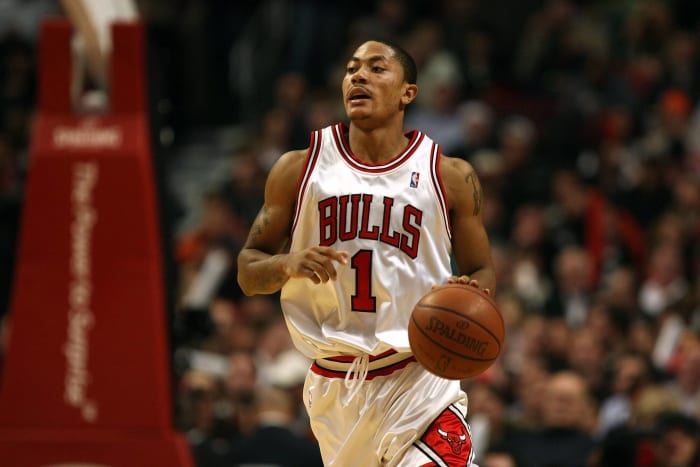
Will Rose end up in the Hall of Fame? That’s the question, because to date every MVP winner is in the Hall or is essentially a lock to make it someday. After averaging 16.8 points and 6.3 assists per game as a rookie to win this award, and after being an all-star in each of the next three seasons, Rose was en route to lock status. Then, he tore his knee up in the playoffs, and things haven’t been the same. However, perhaps like Grant Hill, unexpected longevity will help Rose’s cause. He’s still active, even if he hasn’t played in more than 51 games in a season in over half a decade.
2009-10: Tyreke Evans

Evans followed in Rose’s footsteps as a one-and-done Memphis player who won Rookie of the Year. Unlike Rose, there is no question about Evans making the Hall. Playing for a lackluster Kings team, Evans became the fourth-ever rookie to average 20-5-5, even if he was not efficient in getting there. He never averaged over 20 points per game again, though, and he never became a particularly good shooter. Evans was never an all-star, and in 2019 he was banned for over two years for drug use. While he was technically reinstated, Evans never returned to the NBA.
2010-11: Blake Griffin
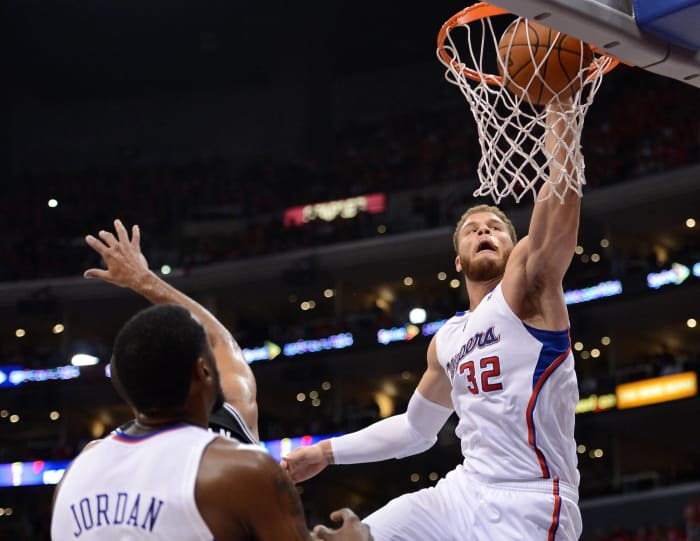
Like Vince Carter, Griffin wowed immediately with his highlight-reel skills. He won Rookie of the Year and the Slam Dunk contest in the same season. Griffin was a legitimately great player at his peak, though, making three All-NBA second teams in a row with the Clippers. What Griffin lacked, unfortunately, was the longevity and ironman capabilities of Carter. Injuries robbed Griffin of his explosiveness, and without that, he became a tertiary piece off the bench for good squads.
2011-12: Kyrie Irving
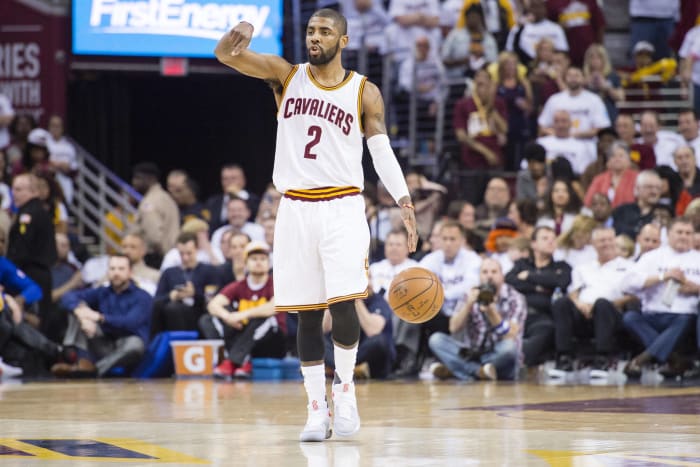
Say what you will about Kyrie — and there's a lot that could be said that we won't rehash here — but the dude can ball. Even though he barely played at Duke, Cleveland made him the first-overall pick. Even though he only played 51 games as a rookie, his 18.9 points per game on excellent shooting made him Rookie of the Year. Since then, he’s ratcheted up his scoring such that his career average is 23.4 points per game. While Kyrie has never been first-team All-NBA, he is an eight-time All-Star, and seems like he will be in the Hall someday.
2012-13: Damian Lillard

Drafted out of Weber State, that basketball powerhouse, Lillard's sharpshooting and clutch scoring quickly made him a star in Portland. As a rookie he dropped 19.0 points and 6.5 assists per game, and he notably started all 82 games in each of his first three seasons. Lillard has gone on to average 30 points per game a couple of times, and you may have heard, but he’s now with the Milwaukee Bucks.
2013-14: Michael Carter-Williams

It felt a little odd when Carter-Williams won Rookie of the Year in 2014, and time has justified those feelings. Drafted 11th overall by the early “Process” Sixers, the Syracuse alum did average 16.7 points, over six rebounds and assists, and even two steals per game. MCW was also a bad shooter, something that never improved. Philly gave up on him after two seasons, and Carter-Williams has gone on to be a journeyman who plays a handful of minutes off the bench when called upon.
2014-15: Andrew Wiggins

The first-ever Canadian Rookie of the Year, Wiggins was notably part of the trade package that brought Kevin Love from Minnesota to Cleveland, where he bolstered LeBron in winning a ring. Cast as a score-first combo guard for a rebuilding franchise, Wiggins averaged 16.9 points as a rookie for the Timberwolves. He was an ironman who became a 20-points-per-game guy with Minnesota, but after being dealt to Golden State, Wiggins found his proper role in the NBA. That is to say, secondary scoring, a bit of ball handling, with solid defense. Now, Wiggins has a ring, and even an All-Star Game appearance.
2015-16: Karl-Anthony Towns
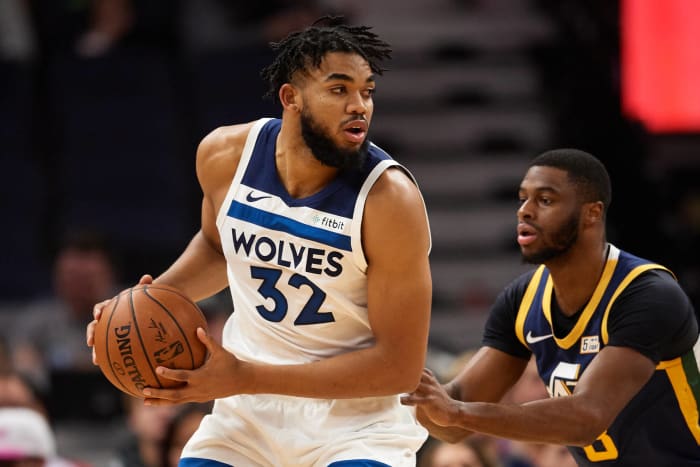
Part of the problem for Wiggins in Minnesota is that the next season the Timberwolves took Towns first overall, and KAT is a true bucket getter. He’s averaged 23.0 points per game in his NBA career and is the self-styled best-shooting big man of all time. There is a reasonable argument to be made there, to be fair. Towns has frustrated Minnesota fans at times, but he’s been its best player since Garnett left — even if he is only a three-time all-star to date — and a two-time third-team All-NBA selection.
2016-17: Malcolm Brogdon

Brogdon is the most-recent senior to win Rookie of the Year, and he could easily be the last. He’s also the only non-first-round pick of the modern NBA to win this award. Milwaukee took him because it wanted a guy who could hit the ground running as a backup guard, and that’s exactly what Brogdon is. There’s a reason why he’s an in-demand journeyman already, and why he’s also won Sixth Man of the Year in addition to Rookie of the Year.
2017-18: Ben Simmons
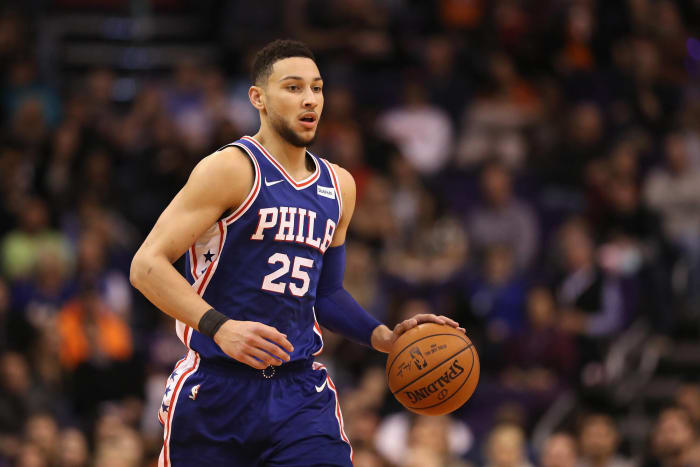
Whoever you root for, if you are an NBA fan just seeing Simmons’ name these days probably makes you sigh deeply. He’s…a bit of a lot to handle, and certainly frustrating in numerous ways. However, let’s not forget that he was once more than the guy with the busted shot who never plays. He averaged over eight rebounds and assists per game in winning Rookie of the Year. Simmons has been an all-star three times and first-team All-Defense twice. The guy was so promising! Then, well, everything that has happened the last couple years played out, and the 27-year-old feels closer to being out of the NBA than being an all-star again.
2018-19: Luka Doncic

Every year, Doncic is a popular pick to win MVP. He hasn’t done it yet, but that’s about the only regular-season mark of success he hasn’t hit. As a rookie for the Mavs, the Slovenian delivered all that he promised in terms of potential. Doncic averaged 21.2 points, 7.8 rebounds, and 6.0 assists per game. In his next four seasons, he was first-team All-NBA and an all-star. That’s basically enough to get him in the Hall of Fame as is, and in theory he’s only getting started.
2019-20: Ja Morant
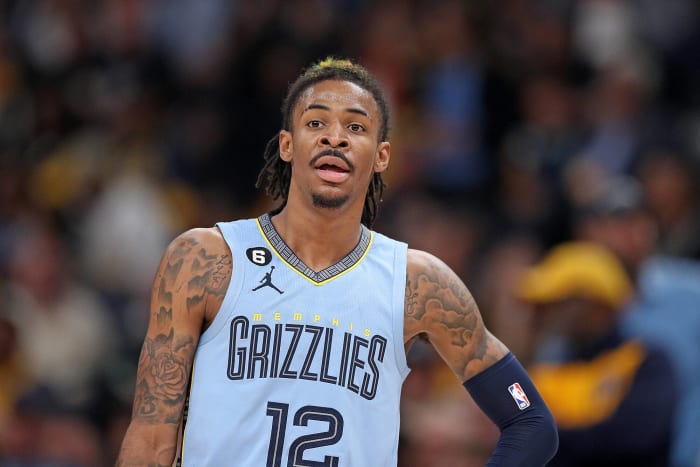
Morant is also only getting started…hopefully. Unfortunately, since his rookie season Ja has become more synonymous with off-the-court bad behavior. On the court, though, Morant has been a force of athleticism and dynamic play. He averaged 17.8 points and 7.3 assists per game as a rookie. After he won Most Improved Player in 2022, the sky seemed like the limit. Morant just has to stay on the court.
2020-21: LaMelo Ball

LaVar Ball talked a big, quasi-psychotic game about his three sons being the collective future of the NBA. LiAngelo never cut it, Lonzo has been solid but unfortunately injury plagued, and LaMelo seems like the last, best hope of a Ball becoming a star. Winning Rookie of the Year was a strong start. He averaged 15.7 points and essentially six rebounds and assists per game for the Hornets, and then was an all-star as a sophomore. His third season was plagued by injury, but across 35 games he averaged 23.4 points and 8.4 assists. Okay, LaVar, it seems like we can give you this one.
2021-22: Scottie Barnes
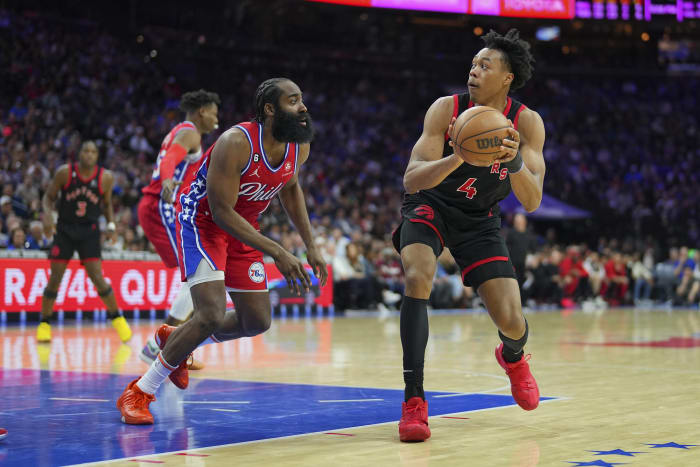
From a vaunted draft class, it’s fourth-overall pick Barnes that won Rookie of the Year. It was a bit of a surprise for a guy who was the ACC’s Sixth Man of the Year in his one season in college. Stepping into a starting role for the Raptors as a rookie, Barnes was a do-it-all wing player, averaging 15.3 points and 7.5 rebounds per game with stout defense. In his second season, Barnes didn’t so much slump but stagnated, so now it is time for him to make a leap.
2022-23: Paolo Banchero
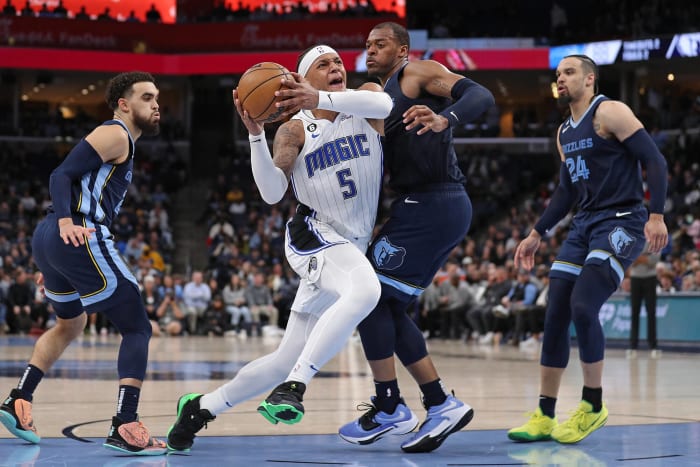
Banchero was actually something of a surprise pick when the Magic took him first overall in 2022, but the decision was quickly rewarded. While, like most rookies, Banchero did not have a fully-developed game, he stepped into the NBA pretty much a walking bucket. He averaged an even 20 points per game, and while he slowed down as the season went on and let a couple other guys into the race, Banchero was still Rookie of the Year in the end.
Chris Morgan is a sports and pop culture writer and the author of the books The Comic Galaxy of Mystery Science Theater 3000 and The Ash Heap of History. You can follow him on Twitter @ChrisXMorgan.
More must-reads:
- ESPN producer gives update on Patrick Beverley snub controversy
- Draymond Green predicts LeBron James' next team
- The 'Highest career PPG in the playoffs' quiz
Breaking News
Customize Your Newsletter
 +
+
Get the latest news and rumors, customized to your favorite sports and teams. Emailed daily. Always free!
Use of this website (including any and all parts and
components) constitutes your acceptance of these
Terms of Service and Privacy Policy.

